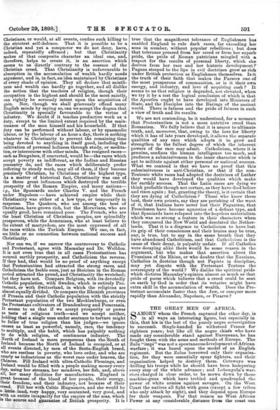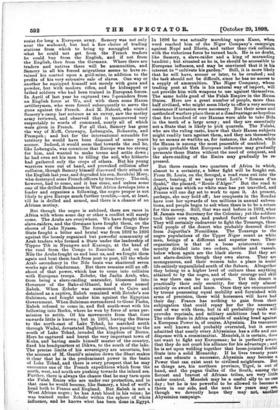THE GREAT MEN OF AFRICA.
SAMORY whom the French captured the other day, is in all ways an interesting figure, but especially in this, that his is the last of the purely negro sovereignties to succumb. Single-handed he withstood France for eighteen years ; but like all the negro chiefs who have made any considerable stand against Europeans, he has fought them with the arms and methods of Europe. The Zulu "impi" was not a spontaneous development of African warfare ; it was based upon the model of an English regiment. But the Zulus borrowed only their organisa- tion, for they were essentially spear fighters, and their organisation helped to destroy them. Cetewayo was drilling his troops while he should have been hampering every step • of the white advance ; and Lobengula's war- riors charged in close order, to be mown down by those. machine-guns which have trebled and quadrupled the power of white armies against savages. On the West Coast the natives all fight with guns (except a few tribes. who only attack by night), and they depend upon Europe for their weapons. For that reason no West African Power at any considerable distance from the coast can resist for long a European army. Samory was not only near the seaboard, but had a fine choice of trading stations from which to bring up smuggled arms ; what he could not get from the French traders he could buy from the English, and if not from the English, then from the Germans. Where there are traders and natives there will be ammunition, and Samory in all his forced migrations seems to have re- tained his control upon a gold-mine, in addition to the profits of his very extensive sale of slaves. One way or another he equipped himself not merely with guns and powder, but with modern rifles, and he kidnapped or bribed soldiers who had been trained in European forces. In April of last year he captured two 7-pounders from an English force at Wa, and with them some Hausa artillerymen, who were forced subsequently to serve the guns against the French. And M. Nebout, who visited Samory's camp last autumn as an envoy, saw the motley army reviewed, and observed that it manoeuvred very respectably to words of command, nearly all of which were given in French. For all that, Samory has gone the way of Koffi, Cetewayo, Lobengula, Behanzin, and Prempeh ; and but for the international scramble for territory he would have been disposed of some years sooner. Indeed, it would seeni that towards the end he, like Lobengula, was conscious that Europe was too strong for him, and wanted to make terms and settle down ; he had even set his men to tilling the soil, who hitherto had gathered only the crops of others. But his young warriors were out of hand, and provoked collision after collision, though Samory himself disowned their attack on the English last year, and degraded his son, Sarakeni Mory, who destroyed some French officers by treachery. The end, however, had to come, and it has come, and unless some one of the drilled Soudanese in West Africa develops into a leader and organises a following, the negro proper is not likely to give Europe much further trouble,—not, at least, till be is drilled and armed, and there is a chance of an African mutiny.
But though the negro is subdued, there are races in Africa with whom some day or other a conflict will surely come. The Arabs are everywhere. We have fought their slave-raiders, and the Germans have fought them, on the shores of Lake Nyassa. The forces of the Congo Free State fought a bitter and brutal war from 1892 to 1893 against the loosely organised but powerful community of Arab traders who formed a State under the leadership of Tippoo Tib in Nyangwe and Kasongo, at the head of the road from the Congo to Zanzibar. And on the Nile the Arabs fought us and beat us, and we fought them again and beat them back from post to post, till the whole Arab ascendency in the Nile basin was shattered seven weeks ago at Omdurman. But there remains still an off- shoot of that power, which has to come into collision with European troops. Zobehr, the Jaalin Arab, who, from being a slave-raiding marauder, blossomed into Governor of the Bahr-el-Ghazel, had a slave named Rabeh. When Zobehr was summoned to Cairo and detained as a captive, Rabeh remained with Zobehr's son Suleiman, and fought under him against the Egyptian Government. When Suleiman surrendered to Gessi Pasha, Rabeh refused to come in, and fled south-west with his following into Borku, where he won by force of arms per- mission to settle. Of his movements from that time onwards little is known; but in 1893, leaving the States to the north-east of Lake Tchad, he marched south through Wadai, devastated Baghirmi, then passing to the south of Lake Tchad, invaded the kingdom of Bornu. Here he captured and burnt the very important town of Kuka, and having made himself master of the country, fixed his headquarters at Dikwa, to the south of the lake. The precise limits of his sovereignty are uncertain, but the account of M. Lentil's mission down the Shari makes it clear that he is the predominant power in the basin of Lake Tchad, and there is every prospect that he may encounter one of the French expeditions which from the north, west, and south are pushing towards the inland sea. Further, there is always the chance that he may turn upon the Fulah Emirs who are under our protection, and in that case he would become, like Samory, a kind of wolf's head both to France and England. But Rabeh is not a West African negro ; he has Arab blood in his veins; he was trained under Zobehr within the sphere of white influence, and he knows what has been done in Egypt. In 1896 be was actually marching upon Kano, when word reached him of the Niger Company's campaign against Nupe and Morin, and rather than risk collision with the victorious force he turned back. He is no doubt, like Samory, a slave-raider and a king of marauding banditti ; but situated as he is, he should be accessible to European influence, and may be convinced that it is his interest to " cultivate his garden." Still, it is more likely that he will have, sooner or later, to be crushed ; and the task should not be difficult, since he has no access to a supply of ammunition. The Niger Company, whose trading post at Yola is his natural way of import, will not provide him with weapons to use against themselves. The same holds good of the Fulah Empire in the Hausa States. Here are a great number of people, more than half civilised, who might seem likely to offer a very serious resistance if invasion were necessary. But their arms and methods of warfare place them at a disadvantage so hopeless that five hundred of our Hausas were able to take Bida in the teeth of a large army ; and they are essentially not a State that is likely to pick quarrels. The Fulahs, who are the ruling caste, know that their Hausa subjects might readily turn against them, and they are themselves by no means so warlike as, for instance, the Arabs, while the Hausa is among the most peaceable of mankind. It is quite probable that European influence may gradually permeate these States without the need of conquest, and the slave-raiding of the Emirs may gradually be re- pressed.
But there remain two quarters of Africa in which, almost to a certainty, a bitter fight will be fought out. From St. Louis, on the Senegal, a road runs out into the desert, bearing, if we may trust Loti's " Roman d'un Spahi," the placard, "Route d'Alger." But the road to Algiers is one which no white man has yet travelled, and France will one day set to work to open it. At present, perhaps, she may hold off ; her conquests in the Soudan have cost her upwards of ten millions in annual subven- tions, and people begin to ask when there is to be a. return for this money. Still, that was said before in 1892, when M. Jamais was Secretary for the Colonies; yet the soldiers took their own way, and pushed further and further. They will certainly endeavour to fight the Touaregs, those wild people of the desert who probably descend direct from Jugurtha's Numidians. The Touaregs to the negro populations of the Upper Niger count as white men, beings of a different and superior race. Their organisation is that of a loose aristocratic com- munity divided into two orders, nobles and vassals, below whom again are the black slaves. But they are not slave-dealers though they own slaves. They are monogamous, and their women take a place in social life entirely unparalleled south of the Sahara. Altogether they belong to a higher level of culture than anything attained to by the negro, and of their courage and skill in war there can be no question. Yet the desert is practically their only security, for they rely almost entirely on sword and lance. Once they are encountered by troops possessing equal mobility and furnished with arms of precision, these wild horsemen will have had their day. France has nothing to gain from their subjugation that could repay her for the necessary cost of war with them, but in all probability raids will provoke reprisals, and military ambitions lead to war. The other State in Africa capable of making head against a European Power is, of course, Abyssinia. Its resources are well known and probably overrated, but it seems admitted that nearly every Abyssinian has a rifle and can dispense with a commissariat. Menelek, it is certain, does not want to fight any Europeans ; he is perfectly aware that they do not court his alliance for his advantage ; and he is set upon welding together that loose-jointed feudal State into a solid Monarchy. If he lives twenty years and can educate a successor, Abyssinia may become a Power that can exist next to civilised neighbours. But as things are, his northern province, Tigr6, is out of hand, and the pagan Gallas of the South, among the fiercest and bravest of African tribes, are very little under control. Menelek may be a useful ally to us one day ; but he is too powerful to be allowed to become a thorn in our side, and the next few years may see, though we devoutly hope they may not another Abyssinian campaign.







































 Previous page
Previous page